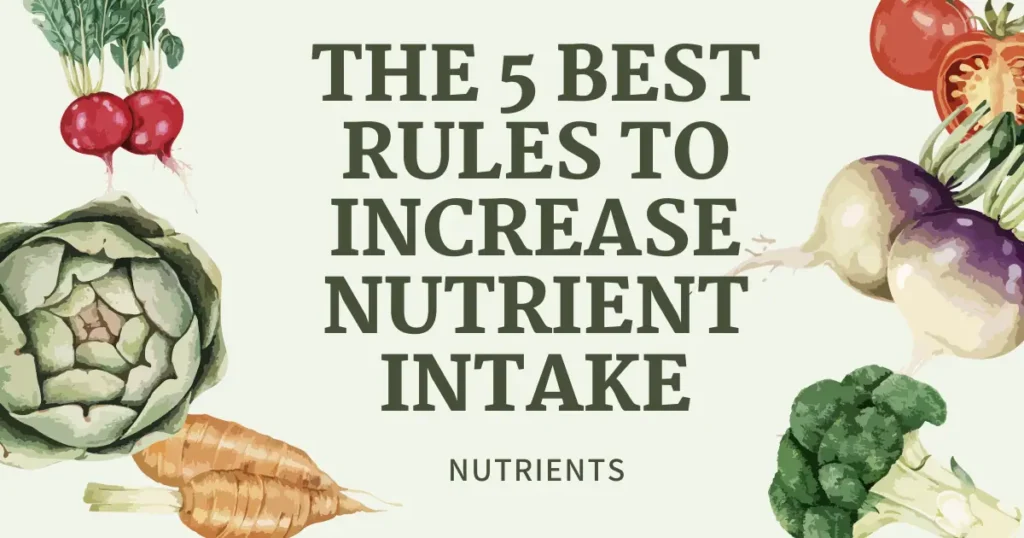
We should be eating in silence and while enjoying our own company. Now the next question is, what should we be eating? I will answer that in the next chapter but before I do so here are 5 basic rules for increasing nutrients intake.by nutrients I mean carbohydrate, proteins, fats vitamins, minerals and of course water, of these carbs, protein and fats are called macro nutrients because our body needs them in higher amounts and vitamins and minerals are called micro nutrients and vitamins and minerals are called micro nutrients because they are needed in smaller amounts. Also 70% of our body is water, so this is something that our body needs all the time.
Table of Contents
1. Diversify Your Plate (Nutrient Intake)
Eat food that is prepared fresh. And consume it within 3 hours of cocking. That means you should be freezing any food for the next day. Don’t deep freeze cooked food. I know for most of us who work regular hours, it is almost impossible to have fresh food for lunch. But you can stick to this rule for breakfast and dinner(nutrient intake). And lets face it, most of us in india have maids who come home in the morning. We might as well use this luxury.
2. Give whole foods first priority (Nutrient Intake)
The smaller the number of people the food is prepared for, the better its nutrient level. More the people, the earlier you start to prepare the food, and the greater the quantity of food cooked, the more oil and heat you use. That’s why restaurant food can never be compared to home food. And that’s why, instead of picking up a salad from your favourite salad bar, you should take a tomato and cucumber with you and eat it as your own on the go salad.
3. Include Colourful Produce (Nutrient Intake)
Eat your vegetables and fruits whole instead of cutting them into piece, because you lose vitamins from their surface. The larger the exposed area, the more the loss of nutrients. So eat a full apple, pear or palm, etc, and don’t chop it into piece. If it’s a big fruit like melon or papaya which you simply have to cut, carve it into big pieces instead of pieces that you eat with your fork. So, hold the big piece in your hand and chew on it and literally let the flow. Messy but oh so satisfying. In the case of vegetables, don’t store them cut. Never ever buy the pre-packed cut vegetables and fruits in the supermarkets. It’s like buying food that’s gone to rot. What’s more, you’re wasting all the packaging which comes along. (and please don’t kill fruits in a juicer or mixer and pulp them into a juice. Not even if you retain the fibre. See box on fruit juices.
4. Balance Macronutrients (Nutrient Intake)
Remain loyal to your genes and eat what you have been eating since childhood. If you are a Punjabi eat your paratha, as a south indian eat your idli, etc. Right from the time you’re in your mother’s womb, your body is used to eating, digestion and assimilating certain Foods. Almost everyone except a Punjabi will complain of a bad stomach after chole.there are two reasons for this non Punjabis don’t cook chole as well and b they lack enzymes required for breaking down chole. Most of us now eat food of all kinds, it’s being part of our global village. But try and eat at least one meal daily that reflects your own genes.
5. Diet balanced (Nutrient Intake)
As much as possible, eat local produce and seasonal food. Climate, altitude, humidity, wind, soil quality, etc influence our digestive system and foods that grow locally. Ayurveda recommends tweaking your diet, habits and lifestyle according to the ritu, or season.sona ate momos in ladakh and they helped her lose weight because Ladakh is dry, windy, cold and at an altitude of 3500 metres. If she ate the same momo’s in aamchi Mumbai which is humid, hot, and at sea level, she would have become fat. Mangoes are great in the summer, eat them just once a day as a mini meal in themselves, and they will give you a season’s supply of antioxidants. Store them in your fridge for rains and you won’t enjoy them as much, they won’t taste half as good and would have lost most of their nutrients.
